LONDON: UK Prime Minister Boris Johnson’s former chief aide lashed out Wednesday at the government he once served, saying people died “in horrific circumstances” because of authorities’ failed response to the coronavirus pandemic.
In a ferocious attack on the competence and honesty of Johnson’s administration, Dominic Cummings claimed the arrival of COVID-19 in early 2020 plunged the government into chaos.
“People did not get the treatment they deserved” as a result, he said. “Many people were left to die in horrific circumstances.”
The UK has recorded almost 128,000 coronavirus deaths, the highest toll in Europe, and experienced one of the world’s deepest recessions in 2020 as three successive lockdowns hobbled the economy.
A mass vaccination campaign that started in December has brought infections and fatalities down sharply, but the government acknowledges it will have to answer serious questions at a future public inquiry.
Cummings’ televised testimony to Parliament’s science and health committees, who are investigating Britain’s pandemic response, gave a dramatic taste of what might come out.
He alleged a disastrous series of bad decisions and false assumptions within government in early 2020, saying Johnson initially regarded the virus as “just a scare story. He described it as the new swine flu.”
Cummings said the administration “was not operating on a war footing,” and officials including the prime minister even went on holiday in February 2020.
“Lots of people were literally skiing,” Cummings said.
By March, he said the government was consumed by chaos that Cummings said “seemed like an out-of-control movie.”
It was “like a scene from ‘Independence Day’ with Jeff Goldblum saying ‘The aliens are here and your whole plan is broken,’” Cummings said.
“The truth is that senior ministers, senior officials, senior advisers like me, disastrously short of the standards that the public has a right to expect of its government in a crisis like this,” he said.
Johnson defended the government’s response, saying “to deal with a pandemic on this scale has been appallingly difficult.”
“We have at every stage tried to minimize loss of life, to save lives, to protect the (health service) and we have followed the best scientific advice that we can,” Johnson said in the House of Commons.
One of the architects of the successful campaign to take Britain out of the European Union, Cummings was appointed a top adviser when Johnson became prime minister in 2019. A self-styled political disruptor, he spoke of his desire to radically shake up the government and expressed contempt for the civil service, many politicians and much of the media.
Initially a shadowy figure, Cummings made headlines in May 2020 when newspapers revealed he had driven 250 miles (400 kilometers) across the country after contracting COVID-19, despite a nationwide stay-at-home order. His defense — that he was seeking childcare help from relatives in case he got sick — rang hollow to many Britons who had made sacrifices and endured isolation to follow the rules.
Cummings said Wednesday that he hadn’t told the whole truth, saying that was a “terrible mistake.” He said his real motivation in leaving London was his family’s safety, because there had been threats to his London home.
Cummings left his job in November amid a power struggle inside the prime minister’s office.
In recent days, Cummings has used Twitter to direct a torrent of criticism at his former employer. He accuses the government of sticking with a policy of “herd immunity” — allowing the virus to spread through the population while protecting the most vulnerable — until it was too late to prevent draconian lockdowns and many deaths.
He said Wednesday that the government believed — wrongly, it turned out — that the British public would never accept strict lockdown measures, and that locking down would simply lead to a later, steeper peak in deaths.
The government denies that herd immunity through infection was ever its policy.
Cummings also slammed the government’s failure to shut Britain’s borders to keep out the virus, called the country’s initial lack of testing capacity a “disaster” and said patients with COVID-19 were rashly discharged from hospitals into nursing homes, where thousands died.
He excoriated Health Secretary Matt Hancock, accusing him of lying to the public and saying he “should have been fired for at least 15, 20 things.” Hancock is due to give his own evidence to lawmakers next month.
The government accused Cummings of glossing over the fact that he was one of the most powerful people in the government when key decisions were being made.
“I’ll leave others to determine how reliable a witness to all this he is,” Transport Secretary Grant Shapps said. “He was there at the time — what his motives would be I will leave to others.”
Cummings said he began “ringing alarm bells” in early March 2020, and apologized for not doing more to change the government’s strategy. Johnson eventually imposed a nationwide lockdown on March 23, and was hospitalized in intensive care with the virus in April 2020.
“If I had acted earlier, then lots of people might still be alive,” Cummings said.
“It was completely crazy that I should have been in such a senior position,” he reflected. “It’s just completely crackers that someone like me should have been in there, just the same as it’s crackers that Boris Johnson was in there.”
Ex-Johnson aide lambasts UK government over COVID failures
https://arab.news/84w9q
Ex-Johnson aide lambasts UK government over COVID failures

- Cummings said Johnson initially regarded the pandemic as “just a scare story. He described it as the new swine flu”
- He said the government “was not operating on a war footing” early in the pandemic. “Lots of people were literally skiing”
Anguish as Kenya’s government demolishes houses in flood-prone areas and offers $75 in aid
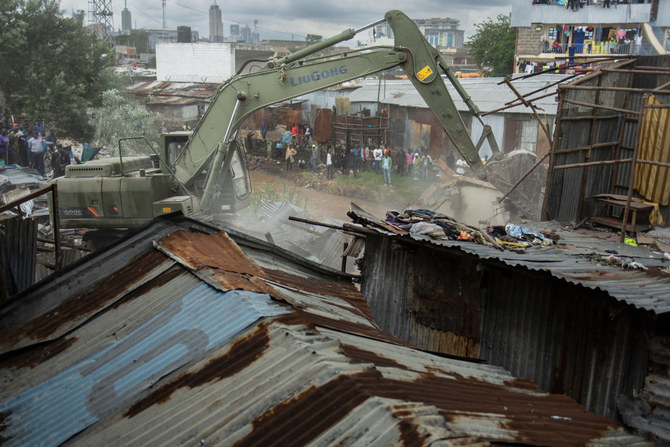
- People living near rivers, dams and other flood-prone areas told to vacate as heavy rains continue to pound
- The number of those affected by the flooding in Kenya has risen to 235,000, with most of them living in camps
NAIROBI, Kenya: Kenya’s government has begun bulldozing homes built in flood-prone areas and promising evicted families the equivalent of $75 to relocate after a deadline passed to evacuate amid deadly rains.
In the capital, Nairobi, a bulldozer ripped through iron-sheet walls as people watched in despair. Security forces with guns and batons stood guard and fired tear gas at some residents. The government last week told thousands of people living near rivers, dams and other flood-prone areas to vacate as heavy rains that have left 238 people dead in recent weeks continue to pound.
Most of those whose houses are demolished say they do not know where to go, even though the government claims they were notified about options. Human Rights Watch has accused the government of an inadequate response.
“Now what are we going to do? We love our president, and that is why we supported him. He should come to our aid,” Jekenke Jegeke told The Associated Press.
President William Ruto, who visited the vast Mathare informal settlement along the Nairobi River on Monday, said those whose houses had been demolished would be given 10,000 Kenyan shillings ($75) to help them resettle elsewhere.
Three people, including two children, have died in Mathare after being run over by bulldozers in the demolitions — one before the president’s visit and two after it — according to civil society groups.
Opposition leader Raila Odinga last week warned the government against demolishing more houses without a resettlement plan in place.
The number of those affected by the flooding in Kenya has risen to 235,000, with most of them living in camps.
Interior Minister Kithure Kindiki on Tuesday reiterated an evacuation order to 200 families living in the Kijabe area an hours’s drive from Nairobi, where about 60 people were killed and houses were swept away when water broke through a blocked railway tunnel last week.
That disaster prompted the government’s evacuation order. It is not clear how many homes across Kenya have been demolished since then.
Meanwhile, Kenya’s Cabinet has said that water levels in the country’s two major hydroelectric dams – Masinga and Kiambere – have risen to “historic levels,” with people living downstream on the Tana River told to leave.
Eastern DR Congo faces ‘catastrophe’ from floods: UN
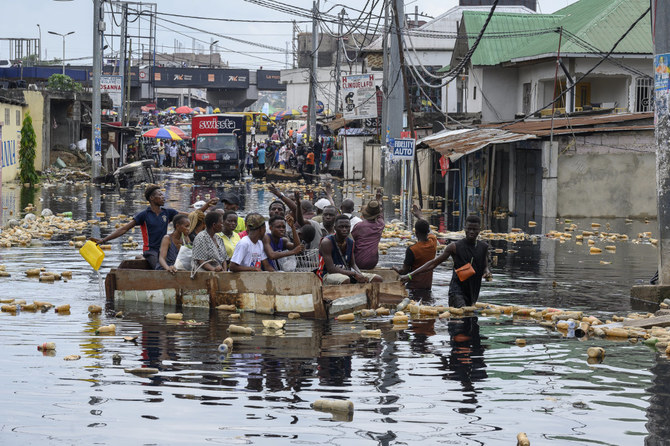
- The UN body voiced concern at the effect on health service provisions as sickness hit affected areas of the country
- Locals were reporting seeing hippos, crocodiles and snakes in flooded inhabited areas, risking fatal attacks, especially on children and livestock
KINSHASA: Eastern DR Congo faces a “humanitarian catastrophe” after being hit by severe flooding affecting about half a million people, the UN World Food Programme said Wednesday.
“Heavier rainfall than usual during the rainy season, prompted by climate change, has forced rivers and lakes to overflow, swallowing towns, villages and roads on the shores,” the WFP said in a report citing “chaos” in South Kivu and Tanganyika provinces.
Worst-affected are Haut-Lomami and Tanganyika provinces, which border the lake of the same name as well as neighboring Burundi, Tanzania and Zambia.
“All around Lake Tanganyika, and areas upstream of the Congo River basin, people have lost their homes, their fields and livelihoods,” the WFP reported, estimating 471,000 people were affected with 451,000 hectares (1.1 million acres) flooded, including 21,000 hectares of cropland.
“People in flooded areas need food, shelter, clean drinking water, health and sanitation support, as well as support to restart their livelihoods.
“However, WFP has very limited resources to respond to the flooding crisis due to current funding levels and the food assistance pipeline situation.”Democratic Republic of Congo (DRC).
“With towns and villages swallowed in the lakes and rivers, diseases are rife. Latrines have overflowed into the water that surrounds people’s homes and sanitation is poor.
“People are forced to wade through and wash their clothes and cooking implements in cholera-riddled water,” said the report, warning of “a whole host of animal-borne diseases.”
Locals were reporting seeing hippos, crocodiles and snakes in flooded inhabited areas, risking fatal attacks, especially on children and livestock.
Amid lost harvests, “people are struggling to feed their families which is leading to more people arriving in health care facilities with symptoms related to months of poor food intake. Especially children are at risk of developing malnutrition.”
Flooding has hit vast swathes of Africa in recent weeks, which have notably claimed 257 lives in Kenya, according to a latest toll Wednesday.
US House quickly defeats Republican hardliners’ effort to oust Speaker Johnson
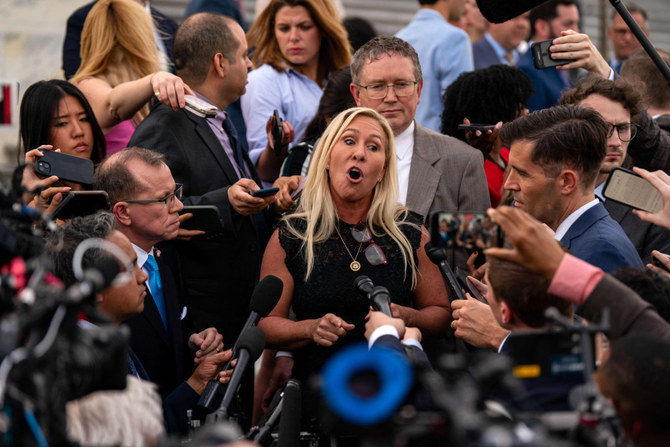
- Democrats joined Republicans in a 359-43 vote to protect Johnson’s speakership to avoid a replay of the chaos that occurred in October
- Hakeem Jeffries, the House's Democratic Party leader, said he hoped to see House Republicans turn against party hard-liners
WASHINGTON: The US House of Representatives on Wednesday swiftly and overwhelmingly defeated an effort by firebrand Republican Marjorie Taylor Greene to remove Speaker Mike Johnson, a fellow Republican, from his leadership role.
Democrats joined Republicans in a 359-43 vote to protect Johnson’s speakership, in a bid to avoid a replay of the chaos that occurred in October when Republicans ousted his predecessor, Kevin McCarthy.
Greene’s move represented a rare Republican defiance of presidential candidate Donald Trump, who in a social media post following the House vote on Wednesday, said it was “not the time” for Republicans to try to push out their own speaker.
Greene’s measure, known as a motion to vacate, showcased the disorder that has marked Republicans’ slim 217-213 House majority, particularly since it had been clear that the effort would fail given Democrats’ opposition.
“I appreciate the show of confidence from my colleagues to defeat this misguided effort,” Johnson, 52, said following the vote. “Hopefully this is the end of the character assassination that has characterized the current Congress.”

Multiple Republicans criticized Greene’s move, including centrist Representative Marc Molinaro.
“This is not an individual who knows how to lead,” Molinaro said of Greene. “She’s not an individual who knows how to negotiate. And she certainly doesn’t seem to have any concern for the stability of the Congress or the people we represent.”
Greene stood flanked by fellow Republican Thomas Massie when she made her move against Johnson, criticizing him for a string of compromises with Democrats, who hold a majority in the Senate.
“Excuses like ‘this is just how you have to govern in divided government’ are pathetic, weak and unacceptable,” Greene said of Johnson. “Even with our razor-thin Republican majority we could have at least secured the border.”
Taunts and jeers
The chamber erupted in taunts and cheers at points as Greene read her resolution, with Democrats at times chanting “Hakeem, Hakeem,” a reference to their party leader, Hakeem Jeffries, in an echo of the many times they voted for him as speaker during Republicans’ multiple rounds of voting for speaker since the current House was seated in January 2021.
Johnson has angered many hard-liners by enacting bipartisan spending measures to avoid government shutdowns and aid US allies including Ukraine, without insisting on strict security measures for the US-Mexico border that Democrats reject.
The House Republicans’ border security bill had no chance of passing the Democratic-controlled Senate.

A bipartisan compromise bill negotiated late last year and early this year in the Senate, with the Biden administration’s approval, was killed by House and Senate Republicans at Trump’s behest.
Johnson could be seen walking around the House floor after Greene began her call on Wednesday for his ouster, with Republican supporters shaking his hand and patting him on the back.
“Republicans have to be fighting the Radical Left Democrats, and all the Damage they have done to our Country,” Trump said in his Wednesday post. “We’re not in a position of voting on a Motion to Vacate. At some point, we may very well be, but this is not the time.”
The situation has bolstered Jeffries, who agreed to save Johnson from ouster after freeing Congress from the road block of Republican infighting by delivering crucial Democratic support for must-pass bills.
Greene in remarks to reporters after the vote did not rule out trying to oust Johnson again.
For his part, Jeffries said he hoped to see House Republicans turn against party hard-liners, saying, “The only thing we ask of our House Republican colleagues is for traditional Republicans to further isolate the extreme MAGA Republican wing of the GOP, which has visited nothing but chaos and dysfunction on the American people.”
Britain and NATO allies must spend more, be tougher, UK’s Cameron to say
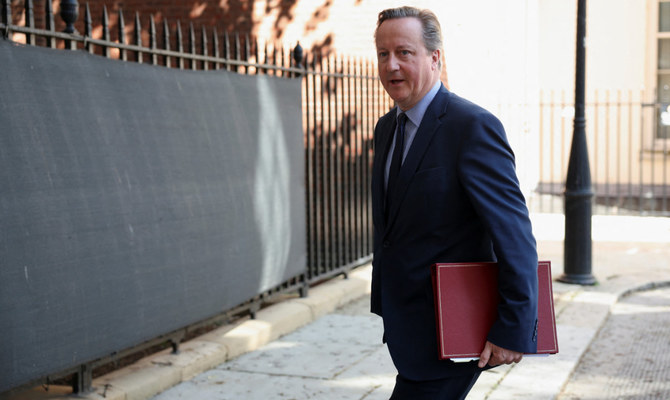
- The upcoming NATO summit must see all allies on track to deliver their pledge made in Wales in 2014 to spend 2 percent on defense
LONDON: Britain’s foreign minister, David Cameron, will urge its fellow NATO members to meet their pledge to spend 2 percent of GDP on defense, and to be tougher and more assertive with adversaries, in a speech to be delivered on Thursday.
In what is billed as his first major pronouncement as foreign secretary, Cameron will say NATO must “out-compete, out-cooperate and out-innovate,” and that Britain must not only bolster existing alliances but also forge new partnerships around the globe.
“We are in a battle of wills. We all must prove our adversaries wrong – Britain, and our allies and partners around the world,” Cameron will say at the UK’s National Cyber Security Center, according to extracts released by his office.
“The upcoming NATO summit must see all allies on track to deliver their pledge made in Wales in 2014 to spend 2 percent on defense. And we then need to move quickly to establish 2.5 percent as the new benchmark for all NATO allies.” Last month, Prime Minister Rishi Sunak said British defense spending would increase to 2.5 percent of GDP by 2030 — an additional 75 billion pounds ($94 billion) over the next six years.
Britain has been one of the most vocal and active backers of Ukraine in the wake of the invasion by Russia, and Cameron, a former prime minister, will say too nations are not learning the lessons of that conflict.
Some in Europe seem unwilling to spend on defense while war rages nearby, Cameron will say, adding that while some nations have criticized attacks on shipping in the Red Sea, only Britain and the United States have carried out strikes in retaliation.
“If (Russian President Vladimir) Putin’s illegal invasion teaches us anything, it must be that doing too little, too late only spurs an aggressor on,” he will say. .”.. This cannot go on. We need to be tougher and more assertive.”
Russia’s biggest airstrike in weeks piles pressure on Ukraine power grid
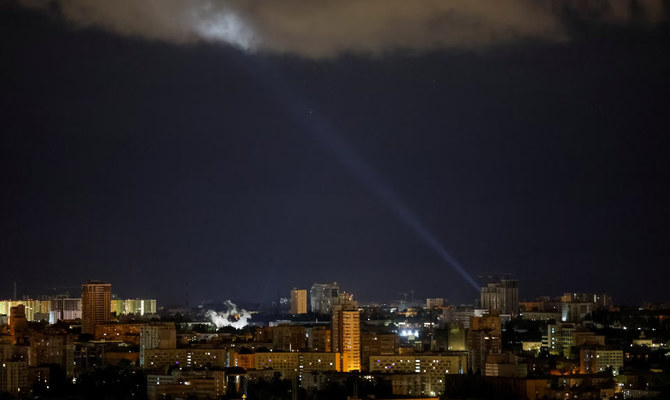
- Russia’s defense ministry said it struck Ukraine’s military-industrial complex and energy facilities in retaliation for Kyiv’s strikes on Russian energy facilities
KYIV: Russian missiles and drones struck nearly a dozen Ukrainian energy infrastructure facilities on Wednesday, causing serious damage at three Soviet-era thermal power plants and blackouts in multiple regions, officials said.
Ukraine’s air force said it shot down 39 of 55 missiles and 20 of 21 attack drones used for the attack, which piles more pressure on the energy system more than two years after Russia launched its full-scale invasion.
“Another massive attack on our energy industry!” Energy Minister German Galushchenko wrote on the Telegram app.
Two people were injured in the Kyiv region and one was hurt in the Kirovohrad region, Interior Minister Ihor Klymenko said.
Galushchenko said power generation and transmission facilities in the Poltava, Kirovohrad, Zaporizhzhia, Lviv, Ivano-Frankivsk and Vinnytsia regions were targeted.
Some 350 rescuers raced to minimize the damage to energy facilities, 30 homes, public transport vehicles, cars, and a fire station, the interior ministry said.
National power grid operator Ukrenergo said it was forced to introduce electricity cuts in nine regions for consumers and that it would expand them nationwide for businesses during peak evening hours until 11 p.m. (2000 GMT).
Ukrenergo CEO Volodymyr Kudrytskyi, interviewed by the Ukrainska Pravda media outlet, said electricity imports would not make up for power shortages. He said hydropower stations had also been hit, clarifying an earlier company statement omitting hydro stations from the list of affected facilities.
Power cuts for industrial users, he said, were “almost guaranteed” but interruptions for domestic users would depend on how well they reduced consumption.
“Many important power stations were damaged,” he said, citing three stations operated by DTEK, Ukraine’s biggest private company, as well as two hydropower stations.
“The damage is on quite a large scale. There is a significant loss of generating power, so significant that even imports of power from Europe will not cover the shortage that has been created in the energy system.”
Russia’s defense ministry said it struck Ukraine’s military-industrial complex and energy facilities in retaliation for Kyiv’s strikes on Russian energy facilities.
“As a result of the strike, Ukraine’s capabilities for the output of military products, as well as the transfer of Western weapons and military equipment to the line of contact, have been significantly reduced,” the ministry said.
WORLD WAR TWO ANNIVERSARY
President Volodymyr Zelensky noted the attacks were launched on the day Ukraine marks the end of World War Two.
“This is how the Kremlin marks the end of World War Two in Europe, with a massive strike, attempting to disrupt the lives of our people with its Nazism,” he said in his nightly video address.
In an earlier online address, Zelensky singled out what he said was the West’s limited progress in curbing Russian energy revenue and some countries that attended President Vladimir Putin’s inauguration for a fifth term in the Kremlin on Tuesday.
Fighting Nazism back then, he said, was “when humanity unites, opposes Hitler, instead of buying his oil and coming to his inauguration.”
Ukraine has stepped up drone attacks on Russian refineries this year despite apparent objections by the United States, trying to find a pressure point against the Kremlin whose forces are slowly advancing in the eastern Donbas region.
Ukrainian strikes on Russian refineries may have disrupted more than 15 percent of Russian oil refining capacity, a NATO military alliance official has said.
After pounding the energy system in the first winter of the war, Russia renewed its assault on the grid in March as Ukraine was running low on stocks of Western air defense missiles.
Prime Minister Denys Shmyhal estimated that more than 800 heating facilities had been damaged and up to 8 GW of power generation lost so far, adding the government needed $1 billion to fund repair work.
DTEK vowed to keep working to restore power at its facilities, and its CEO, Maxim Timchenko, called on Ukraine’s allies to provide more air defense systems.
Officials did not name the facilities hit on Wednesday, part of a policy of wartime secrecy that Kyiv says is needed to prevent Russia using the information for further strikes.
But Lviv governor Maksym Kozytskyi said Russia attacked a natural gas storage facility in his region in the west of the country, Radio Free Europe/Radio Liberty reported.
In central Poltava region, energy infrastructure was hit by a drone, Poltava Regional Governor Filip Pronin said.
The governors of Vinnytsia and Zaporizhzhia said critical civilian infrastructure facilities were damaged.





















